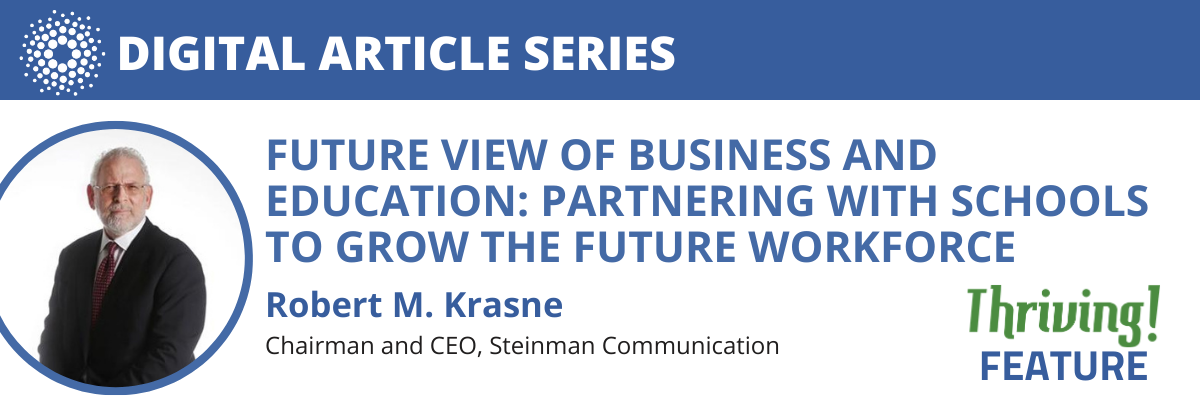Partnering With Schools to Grow the Future Workforce
by Robert M. Krasne, Chairman and CEO of Steinman Communications
As a kid growing up in a small town, my perception of the roles and responsibilities of
educational and business institutions were quite distinct. Sitting at a desk among a row
of desks in school to listen to teachers drone on was education. Walking to the bakery
to get a Danish for a nickel was business.
My understanding has become a bit more nuanced as the leader of a 228-year-old
business. I’ve learned how innovation and adaptability are core values that enable
colleagues to do their best work. Those attributes are essential in education today and
also in business recruitment, training and professional development.
Businesses around the county and across the country are in desperate need of
qualified workers. Lancaster County faces a shortage of nearly 10,000 workers
annually for the next decade! This number was calculated by Lancaster’s Center for
Regional Analysis by adding the number of new jobs created annually to the vacancies
that will occur each year due to retirements, minus the number of new workers who
will be entering the workforce.
The Lancaster County STEM Alliance, www.lancasterstem.org, an organization funded
by The Steinman Foundation, convenes business, education and nonprofit leaders
together to strategize on how best to address this shortfall. Recently, the LCSA
brought an array of nationally recognized experts on workforce development to the
area to help frame the issues and refine strategies. The experts offered best practices
for K-12 education, business & industry, higher education, and classroom teachers in
developing and supporting the knowledge and skills of Lancaster County’s future
workers.
Those of us of a certain age learned that circumstances for people entering the
workforce today are very different than they were when Baby Boomers were starting
their careers. Back then, because of the stiff competition for the best jobs, we had to
distinguish ourselves to employers. Today, members of Gen Z expect prospective
employers to distinguish themselves because of the plethora of opportunities available
to them.
Many Baby Boomers found their niche in an organization and spent their career with
the same firm. Today, younger employees are not averse to frequently changing jobs
or adapting to new work environments.
New workers today need to be job ready. The old ‘drill and kill’ approach to education
doesn’t teach relevant skills for the workplace and the days of big corporate training departments are long gone. New hires need to be problem solvers who can work
collaboratively and communicate effectively the day they begin employment.
The LCSA is working diligently to ensure that no worker is lost to our workforce. In
collaboration with Lancaster Chamber and Career Ready Lancaster, it is creating
Inspire Lancaster, a digital platform that will provide high school students and
educators with access to work-based learning experiences with some of Lancaster
county’s most innovative employers.
Research tells us that career exploration experiences need to start earlier – ideally in
middle school when many students thinking about their future career options.
Middle school can be a tumultuous time for young people when social concerns
suddenly start to outweigh academic pursuits. Unfortunately, when faced with
traditional classroom instruction, many students don’t connect their academics to the
world of work. By the time they reach high school … if they get that far… they have
begun to view academics as uninteresting, unimportant, and irrelevant to their lives.
In Lancaster County, far too many kids choose to leave school after the 8th and 9th
grade. Even more stay in school but tune out academically.
If we’re going to grow a world-class workforce in Lancaster County, we need to push
work-based learning down into our middle schools so that we can capture the imaginations and aspirations of young people before they tune out to learning…and
before some of their number begin to drop out.
If we lose students prior to graduation, our workforce skill deficit will grow.
School districts are doing everything they can to ensure students are career ready
including helping students create career readiness portfolios that begin in elementary
school and extend through high school, engaging students in work-based learning
experiences, and supporting student attainment of industry-recognized credentials
prior to high school graduation.
But they cannot do this work alone. Contrary to what I thought as a youngster,
business is not distinct from education. Business must partner with education to
prepare everyone to be members of our workforce and community so we can all enjoy
a prosperous future.
Robert M. Krasne, CPA CFA
Chairman and CEO
Steinman Communications
not secure

